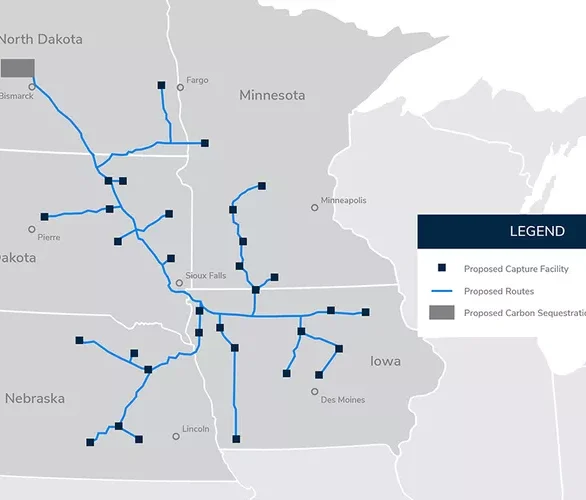
South Dakota legislature passes ‘Landowner Bill of Rights’ for carbon pipeline projects
South Dakota legislature has passed a package of bills that may clear the way for the construction of carbon capture and sequestration (CCS) pipeline projects through the state.
The South Dakota House and Senate passed three bills on Wednesday — Senate Bill 201, House Bill 1185, and House Bill 1186 — deemed the “Landowner Bill of Rights.” The bills set guidelines carbon capture utility projects must meet to do business with landowners in South Dakota.
“I stand with South Dakota landowners and always will,” says Governor Kristi Noem, R-S.D. “I am looking forward to signing a Landowner Bill of Rights that will provide new protections for landowners and allow for economic growth to move forward through a transparent process.”
The South Dakota Farm Bureau (SDFB), and state corn growers and soybean associations released a joint statement praising lawmakers for passing the new pipeline bills. The group says the bills deliver landowner protections and property tax relief to those affected, and preserve local zoning.
“We fought to make sure that affected landowners would be treated fairly and share in profits,” says Scott VanderWal, SDFB president. “Both affected property owners and counties will have an annual amount to apply toward property tax relief or county general funds.… SDFB also has a policy that respects local zoning and the final bill ensures a process-based opportunity for county planning and zoning to be considered during the Public Utilities Commission (PUC) permitting process — that was a key factor in our ability to support this legislation.”
Bill guidelines
These guidelines are intended to have a direct impact on landowners and protect them as the emerging carbon capture industry finds its footing in agriculture.
“When South Dakota farmers succeed, all of South Dakota succeeds, and that cuts both ways. When South Dakota farmers have limited access to national and global markets, our whole state suffers,” says Senator Casey Crabtree, R-S.D., District 8. “These bills reflect the values of South Dakota and set the path for the future of farming in South Dakota.… This package of bills sets the new standard for other states to follow to secure their economic future and provide a blanket of strong protections to landowners.”
Senate Bill 201 collects payments from CO2 pipeline companies at the county level per linear foot of the pipeline. The surcharge will provide $0.50 per foot to pipeline landowner property tax relief and $0.50 per foot to county general discretion for an estimated $3.6 million of tax relief annually to South Dakota counties.
HB 1185 establishes a process for landowners to be informed and compensated for access by companies for surveying and siting. It also establishes a process to challenge requests for access. This bill sets a $500 payment for survey access to the landowner.
HB 1186 sets easement standards for CO2 pipeline planning projects in South Dakota. Easements will be required to be written, expire in 99 years and be abandoned if the pipeline is out of use for five years or more or if the operator fails to file for permitting within five years.
The complete guidelines are as follows:
- Construct a minimum depth of 48 inches, a full foot beyond federal requirements.
- Assume lifetime drain tile damage repair policy.
- Assume pipeline leak liability protection.
- Indemnify landowners from any damage caused by the pipeline.
- File an agricultural impact mitigation plan with the South Dakota PUC.
- File a dispersion analysis report with the PUC.
- Require land agents to have a tie to South Dakota.
- Provide landowner with survey results.
- Only mortgage pipeline infrastructure — not an easement holder’s property.
- Limit easement duration to 99 years.
- Construct CO2 pipeline within five years of easement enactment.
- Abandon easements if the CO2 pipeline is out of service for five years.
- Pipeline easements must be written.
- Follow survey and access rights.
- Provide an access payment to the landowner for survey and siting.
A way forward for pipelines
The South Dakota PUC has previously challenged pipeline companies attempting to establish business in the state. The “unpredictable nature of the regulatory and government processes” in South Dakota and Iowa contributed to the ultimate cancellation of Navigator CO2’s proposed Heartland Greenway, according to the final press release from Navigator CO2 in October 2023.
Summit Carbon Solutions is the only remaining CCS company with plans to construct a major pipeline through South Dakota. Prior to the passing of the Landowner Bill of Rights, Summit also faced challenges in the state, and had been working through county ordinances to receive siting authority.
Lee Blank, CEO of Summit Carbon Solutions, says the company is thankful for the passage of this series of bills, and believes this is a victory for the South Dakota ethanol industry and all parties involved.
“We appreciate the attention and engagement from so many South Dakotans, especially our partners and agricultural leaders,” Blank said in a press release. “We look forward to doing our part to create and maintain successful relationships going forward.… This legislation is unequivocally pro-landowner, pro-business, pro-farmer, and pro-ethanol. We are excited to have a path forward that establishes best practices we are committed to following in South Dakota and across our entire project.”
Iowa Renewable Fuels Association (IRFA) Executive Director Monte Shaw says this package of bills provides an equitable path forward for the future of carbon capture and sequestration projects.
“It is our view that with a workable path forward in South Dakota and the regulatory process well on its way in Iowa and North Dakota, we can now see light at the end of the tunnel,” Shaw says. “CCS cuts Iowa ethanol’s carbon score by more than half. It single handedly opens up a massive new 35-billion-gallon sustainable aviation fuel market for Iowa corn farmers.”
